Deutsche Version auf Nuklearia.de
Climate activists from around the world demonstrated against shutdown of German nuclear power plants

Nuclear power advocates from 20 countries and four continents gathered in Berlin on Saturday to protest Germany’s nuclear phaseout. The keynote speaker was American climate scientist Dr. James Hansen. He had warned the U.S. Congress about climate change as early as 1988.
At Saturday’s event, Hansen explained the direct connection between Germany’s nuclear phase-out and the harmful environmental effects it would cause. Because nuclear energy is compact and uses very few raw materials, he said, it is inherently environmentally friendly.
“Germany will make a mockery of the goal of limiting global warming to 1.5 degrees Celsius if it increases the use of natural gas and limits the use of nuclear power,” Hansen told more than 300 supporters and interested passersby outside the Brandenburg Gate.
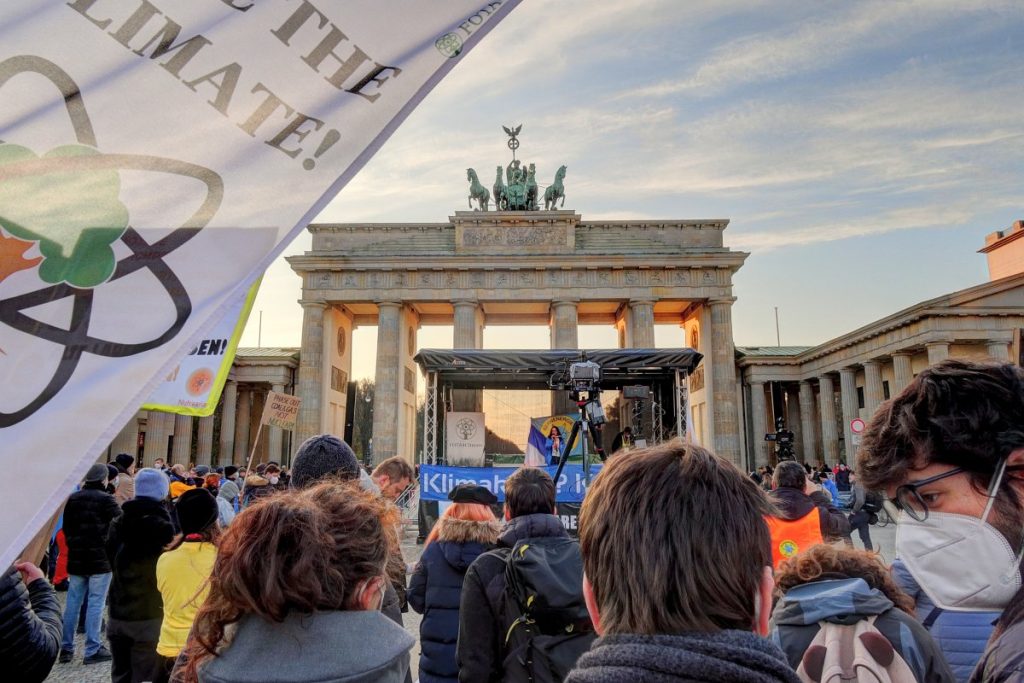
Coal phase-out before nuclear
Germany’s remaining nuclear power plants generated 26% of Germany’s climate-friendly electricity in the first half of 2021 – more than all German solar plants combined.
Germany plans to shut down three of its six remaining nuclear power plants by the end of 2021, and the other three by the end of 2022. In the current climate and energy crisis, Germany is debating whether to keep nuclear power plants and phase out coal more quickly instead.

Demonstration for lifetime extension
The demonstration for a lifetime extension of nuclear power plants had been called by the organizations Nuklearia and FOTA4Climate from Germany and Poland, Mothers for Nuclear and the international Nuclear Pride Coalition (“Stand Up for Nuclear”).
Most of the demonstrators in front of the Brandenburg Gate had come from Germany. In this country, ten years after the Fukushima disaster, the extension of nuclear power plant operating lives is once again in the majority of the population. This is shown by representative surveys conducted by the opinion research institutes YouGov, INSA, Allensbach and Civey.
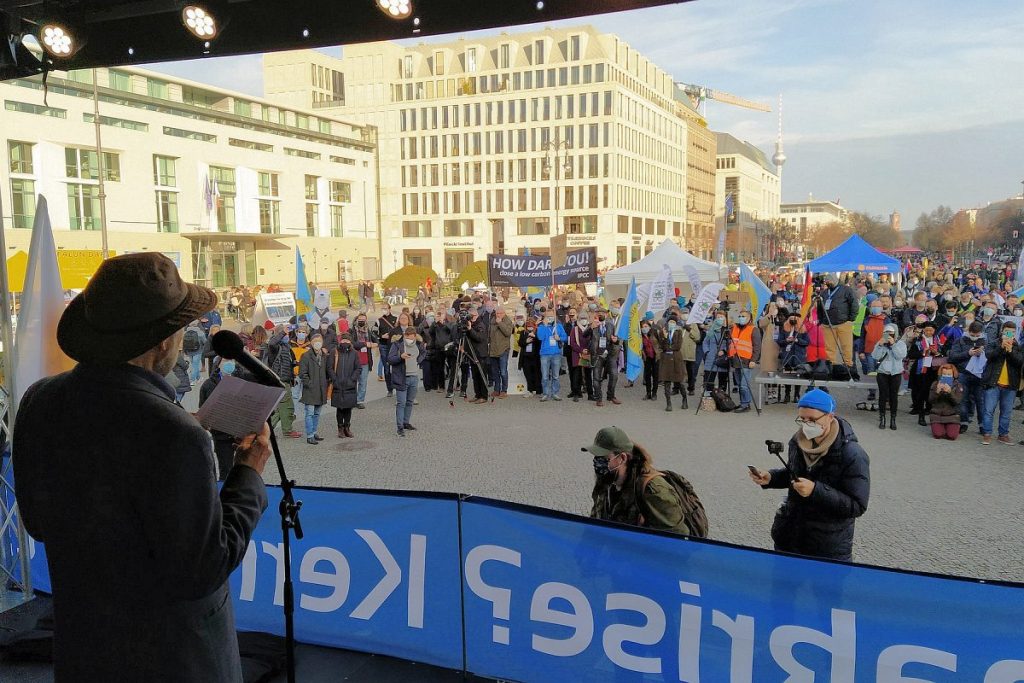
James Hansen was keynote speaker
The keynote speaker was the well-known climate researcher James E. Hansen from the USA. Hansen had already drawn attention to the climate crisis in the 1980s and in 1988 warned the U.S. Senate of the consequences of man-made climate change that he had modeled.
In his speech, Hansen praised the progress made in climate protection by Germany’s energy transition. However, he criticized Germany’s nuclear phase-out for completely undoing these climate protection efforts. By doing so, he said, Germany is causing great harm to the global community and to future generations.
Hansen was interviewed by television stations and newspapers during the demonstration, including CNN, NPR, ZDF, MDR, WELT, Stern and Spiegel.
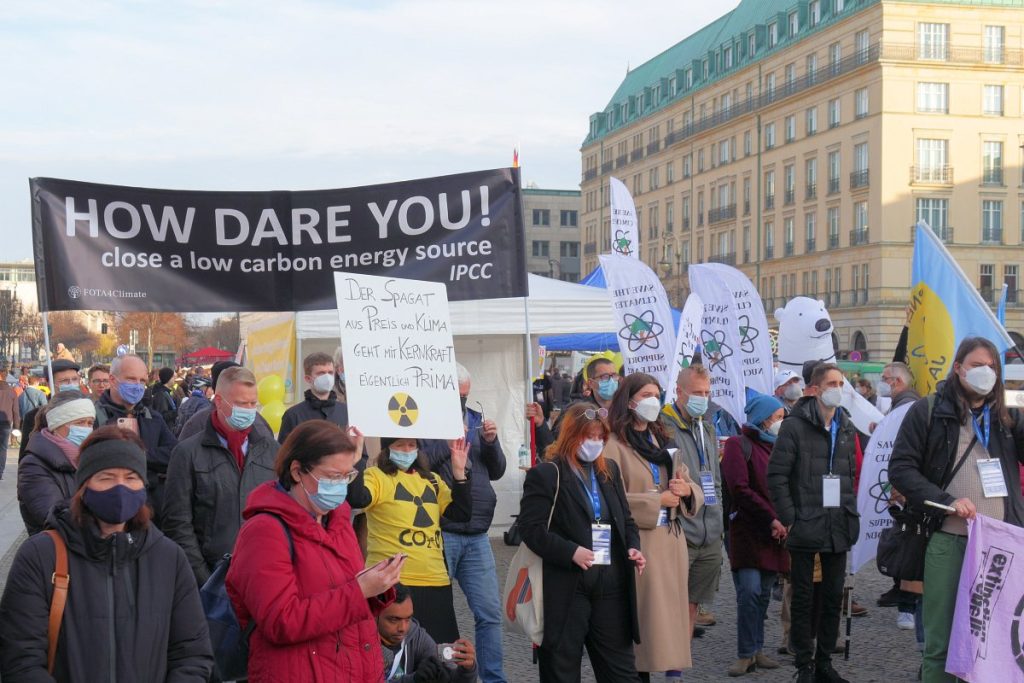
German blockade on EU taxonomy
The foreign speakers had other messages for German climate policy besides the appeal for lifetime extension.
The European speakers particularly disliked German opposition to nuclear power in the EU taxonomy. The majority of EU countries and the EU’s Joint Research Centre are in favor of including climate-friendly nuclear power in the taxonomy for sustainable finance.
German Environment Minister Svenja Schulze, on the other hand, is actively blocking climate protection through nuclear power. Instead, Schulze is making the case for Russia’s Nord Stream 2 pipeline and new natural gas power plants.
Polish speaker Adam Błażowski of FOTA4Climate called coal and natural gas harmful to the climate and “the worst choice.” German speaker Björn Peters of Aktionskreis Energie und Naturschutz e. V. (AKEN) even called for the immediate resignation of Svenja Schulze in light of this failure of German climate policy.
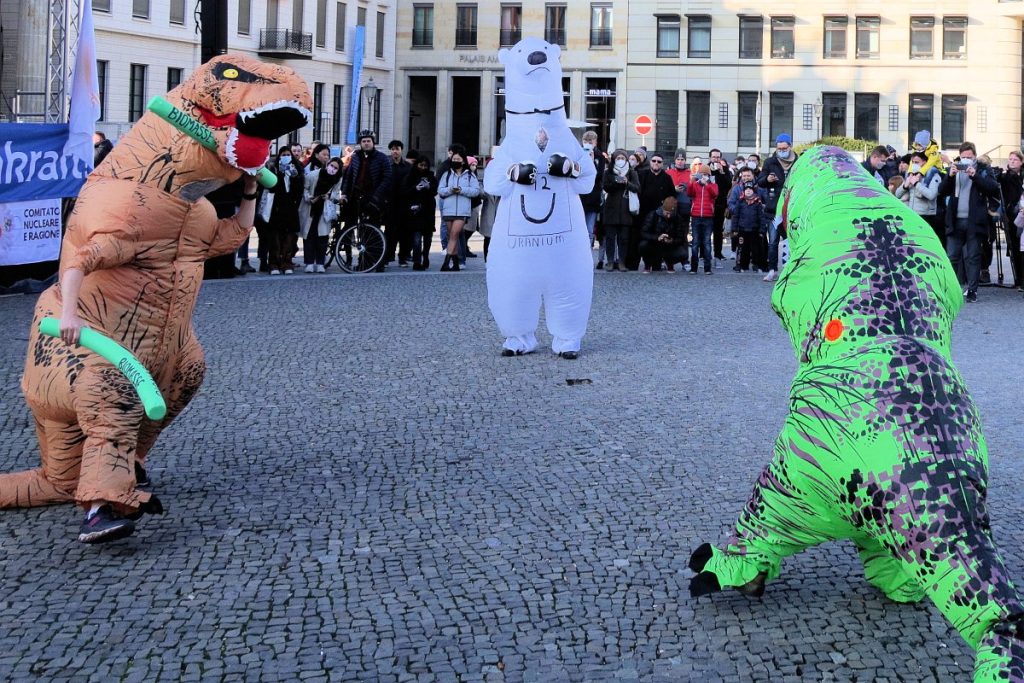
Polar bears would choose nuclear power
But the three-hour program in front of the Brandenburg Gate did not only consist of speeches. A dozen participants dressed up as two-meter tall polar bears. They wanted to draw attention to the rapidly melting ice in the Arctic and the consequences of the climate crisis for biodiversity.
The polar bears danced on roller skates on the open space in front of the stage. As symbolic figures of climate-friendly nuclear power, they engaged in a battle against the fossil dinosaurs “Gasosaurus Rex” and “Kohlosaurus Rex” – successfully, of course.
Singing interludes also livened up the program. Songs like “Power for the people” or “Change of climate” to well-known melodies had reference to climate crisis, energy crisis and nuclear power.
Polar bears dancing to “We need Net Zero”
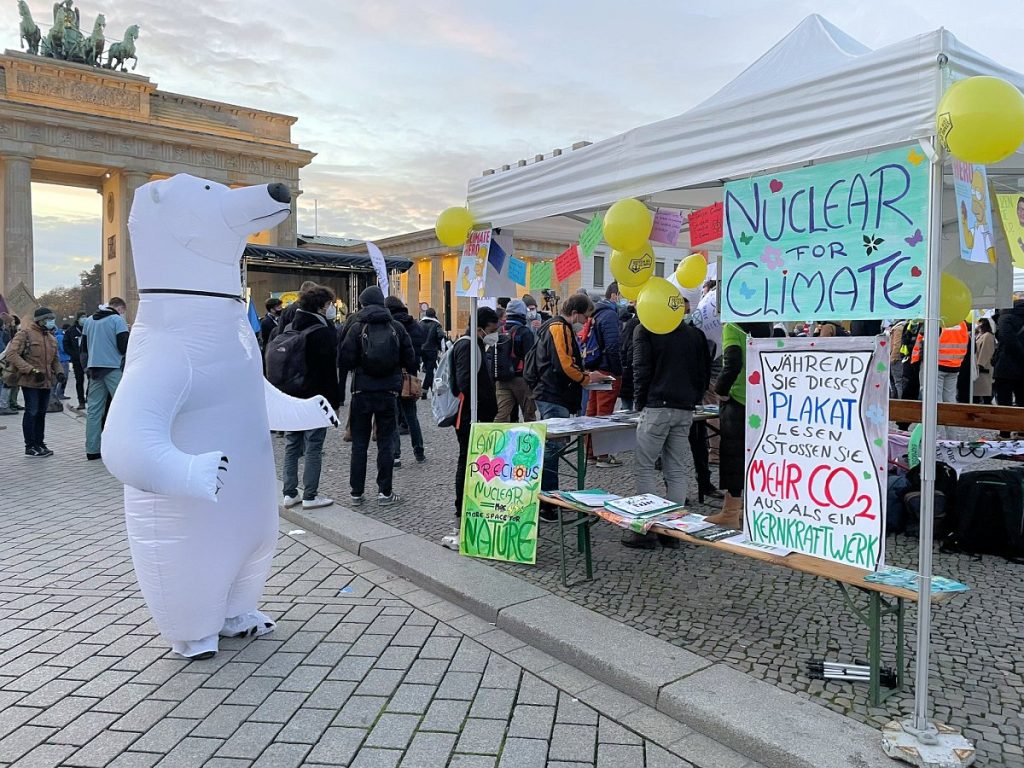
Information booths for education
Three information booths offered passers-by the opportunity to learn more about nuclear energy, which was gladly accepted.
Flyers and information material were available at the Nuklearia stand. Nuclear power experts from the association answered questions from the curious.
Those interested could have their knowledge of nuclear energy tested in a quiz at the Mothers for Nuclear booth and earn a “nuclear power diploma”.
At its booth, FOTA4Climate offered the opportunity to measure the natural radioactivity of bananas and rock samples with a Geiger counter.
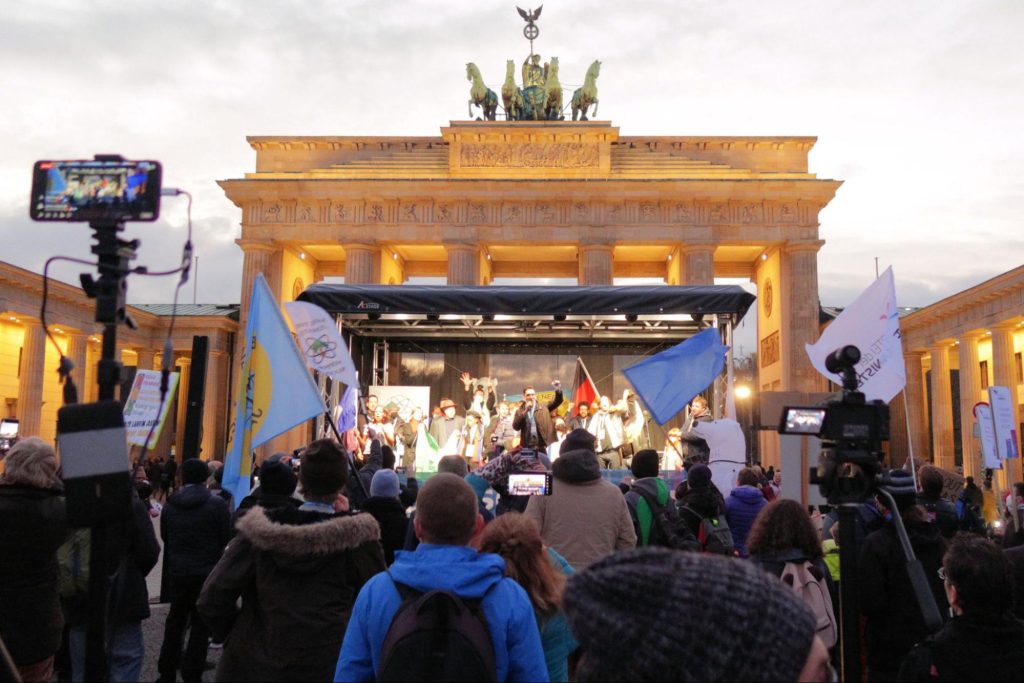
Nuclear power in the global south
Representatives of the global south also participated in the protest. In large parts of Africa, South America and South and Southeast Asia, there is energy poverty. The big challenge for these countries is to build a cheap energy supply without increasing CO₂ emissions.
Collins Khaemba Wafula (Nuclear Energy is the Better) from Kenya explicitly spoke against a supply from volatile renewables because they are not reliable. He blamed Germany for the fact that the nuclear program in Kenya is currently on hold.
Shirly Rodriguez (Latin America Nuclear Society) from Peru emphasized that many organizations and scientists are in favor of expanding nuclear energy. She attributed the decision to phase out nuclear power in Germany to misinformation and called for clarification.
Ningi Princess Mthombeni (Africa4Nuclear) from South Africa spoke of her experience with the two reactors at Koeberg, the only nuclear power plant in her country to date: “They generate the cheapest electricity in the South African grid.” Mthombeni pointed out the hypocrisy of Germany’s nuclear phase-out in the face of the climate crisis.
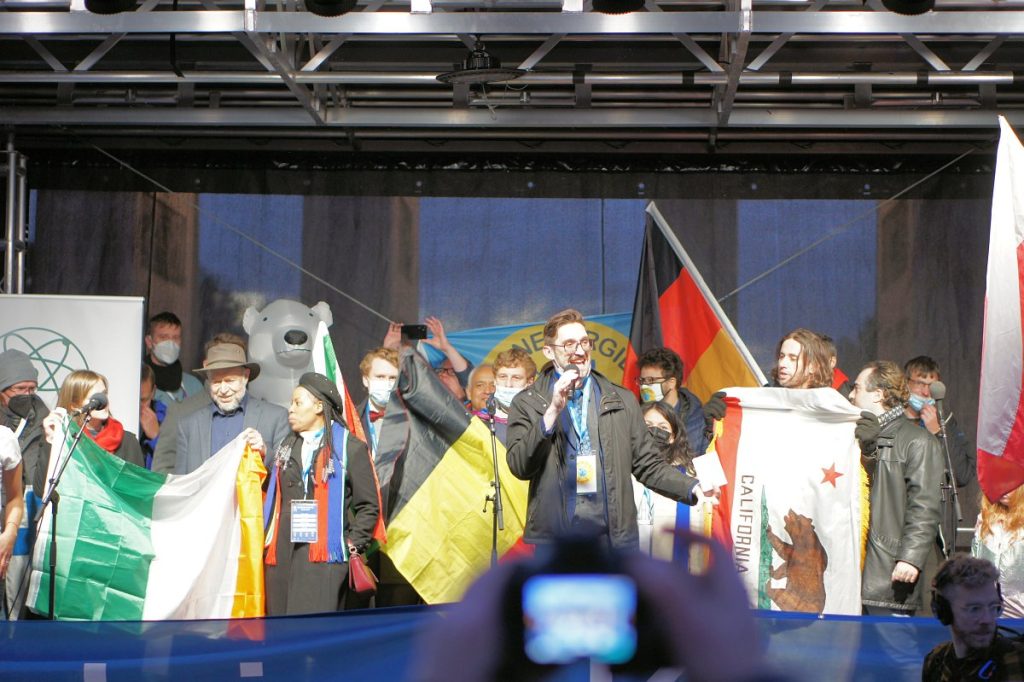
List of speakers:
- Germany: Rainer Klute, Simeon Preuß, Britta Augustin (Nuklearia), Björn Peters (Aktionskreis Energie & Naturschutz (AKEN)), Amardeo Sarma (Gesellschaft für die Wissenschaftliche Untersuchung von Paraphänomenen (GWUP)).
- Poland: Adam Błażowski, Agata Brzezińska, Julia Gałosz (FOTA4climate).
- Belgium: Emeric Massaut (100TWh)
- Denmark: Johan Christian Sollid (Foreningen Atomkraft Ja Tak)
- France: Myrto Tripathi (Voix de Nucléaire/Voices of Nuclear)
- Finland: Ari Greus, Inari Kulmunki (Finnish Ekomodernists) Ireland: Sarah Cullen (18for0)
- Italy: Luca Romano (L’avvocato dell’atomo)
- Canada: Chris Keefer (Doctors for Nuclear, Decouple Podcast)
- Kenya: Collins Khaemba Wafula (Nuclear Energy is the Better)
- Netherlands: Yonis le Grand (Dutch Ecomodernist Society)
- Norway: Mathias Meyer (Climate friends for Nuclear)
- Austria: Dominic Wipplinger (Austrian Nuclear Society young generation, Nuklearia)
- Peru: Shirly Rodriguez (Latin America Nuclear Society)
- Switzerland: Werner Bechtel (AtomInitiative Schweiz)
- Slovakia: Andrej Repinský (EAFES)
- South Africa: Ningi Princess (“Princy”) Mthombeni (Africa4Nuclear)
- Czech Republic: Lubomir Bures (RePlanet)
- USA: Mark Nelson, Paris Ortiz-Wines, Ryan Pickering (Radiant Energy Fund), Doug Sandridge
Quotes from speakers (contact details available)
Adam Błażowski, FOTA4Climate, Poland: “Climate change is serious! The boat is sinking and German Policy is blocking proven solutions. Germany, please WAKE UP! Leave nuclear alone, focus on coal
and gas! Let other countries decarbonize their way! Something is wrong with your debate and politics if renowned climate expert like James Hansen needs to come over to Berlin and point out the
mistakes in climate change mitigation plan! You are now almost alone in the EU. Alone with Austria and Luxemburg! 12 EU countries insisted on including nuclear in Taxonomy!”
Collins Khaemba Wafula, Nuclear Energy is the Better (NUeB), Kenya: “Germany’s decisions to face out nuclear, is a spinebreaker for Africa’s investment into nuclear. We got the renewables in Kenya,
but it’s a fallacy for energy poverty – and a fantasy of development. Without nuclear power, Kenya is looped into a long term dependable on unreliable source (s) of “green” energy. Germany’s decisions
have made our decision makers to back down nuclear development progress: (a) The main power agency is on the verge of being dismantled. (b) There is a more reason to reject nuclear into Kenya.
(c) Main reason behind this: the “Big Dog” GERMANY is shutting down it’s operational nuclear power plants. – Where will those in nuclear fields get jobs? How and why will we teach our children about nuclear then? This gotta STOP!”
Ningi Princess Mthombeni, Africa for Nuclear, South Africa: “Those who oppose nuclear in SA are using Germany as an example by saying why should SA build nuclear power plants when a rich
country like Germany is shutting down theirs. They are ignoring the fact that currently in SA, nuclear offers the cheapest electricity on the grid. Germany’s anti-nuclear stance borders on climate change
hypocrisy, otherwise, they would not be hell-bent on shutting down nuclear power plants even though it has been proven that nuclear power plants generate the clean and reliable baseload electricity that is needed for combating climate change while industrialising economies.”
Björn Peters, Aktionskreis Energie und Naturschutz e. V.: „The German Nuclear Phase-out will increase carbon emissions by 70 Million tons annually and cost our neighbours 50-100 billion euros
annually in higher power, carbon, coal, and gas prices. As most markets are operating on a pan-European level, the German nuclear phase out will make power, carbon emission certificates, gas
and coal more scarce and hence more expensive. In this light, Environment Secretary Svenja Schulze overstepped a line when she formed a coalition of five European States against the majority of
European countries who would like to include nuclear in their energy mix. Her anti-French coalition will come at a high cost for Europeans and will be associated with a high political price for Germany.
To contain the damage being done, we demand Svenja Schulze should be sacked immediately or to step down.”
Andrej Repiský, EAFES, Slovakia: „The example of Slovakia shows how decarbonization is feasible for other EU countries with similar natural conditions. We could never have done it without nuclear energy, and neither can Germany. In their aggressive and anti-technology foreign policy, Germanpoliticians forget that some EU countries are landlocked and thus cannot build offshore wind farms. Germany absolutely must stop this recklessness.“
Dominic Wipplinger, Österreichische Kerntechnische Gesellschaft junge Generation (ÖKTG-JG), Nuklearia: „Nuclear energy has an enormous potential as an energy source, which can be traced back
to the energy density of the fuel. You can get an enormous amount of energy from a small amount of nuclear fuel, which means little mining, little import, little waste, but also independence from energy
imports, from weather and climate influences, because enough fuel can be stored for a long time without any problems. Therefore, nuclear energy is also environmentally friendly and a key
technology in climate protection. I hope this will soon be understood all over the world, also in my home country Austria.”
Luca Romano – L’avvocato dell’atomo – Italy: “Germany’s experiment is not a first timer: Italy phased out nuclear completely between 1987 and 1990. We were told it could be replaced by renewables: it
was a lie. We were told it was expensive anyway: it was a lie. We were told we didn’t need it: it was a lie. Since then Italy became the first net electricity importer in the world and our emissions have
been flatlining for decades. Please, don’t follow in our footsteps and stop this madness”.
Simeon Preuß, Nuklearia e.V., Germany: “Too late, too slow, too expensive, too dangerous, people don’t want it, it’s been decided, it’s a ghost debate, problem this, problem that – we all know the
objections. Is that how you would react in an emergency?! If you’re drowning and someone throws you a life preserver – would you say, “Oh, it’s blue. Can I have a green one, please?” This is how to
ridicule the term “climate emergency”, reducing it to an electoral vehicle or a marketing joke for renewables – good sources, by the way, they just can’t do it alone! If nuclear energy wasn’t only
emissions-free, but also green, renewable and yadada – there would be ten solutions for any of these alleged problems already on the table!”
Mathias Meyer, climate friends for nuclear, Norway: “Europe needs a clean, abundant, independent and stable power source transcending us into a united green optimistic future. Europe need nuclear
to bring warmth into our homes during the cold winters. Europe needs nuclear to bring light, when there is dark. Therefore, Germany, the industrial locomotive of Europe, needs to keep the nuclear
power plants up.”
Sarah Cullen, 18for0, Ireland: “Without considering all energy options it is impossible to know which technology mix is the best. Excluding nuclear in policy is inherently unscientific. We deserve solutions to climate change with a basis in science, not rhetoric. Germany’s nuclear phase out worsens Germanys contribution to climate change. Climate change doesn’t respect national boundaries and decisions made in Germany affect us all. We all have to ensure science prevails and a low carbon, stable and affordable mix is achieved.”
Shirly Rodriguez, Latin America Nuclear Society, Peru: “Multiple organizations and scientists have concluded that we can’t achieve climate prosperity without nuclear energy. Climate justice must be done in Germany by not shutting down the cleanness source or energy in the country. Coming from COP26, it is evident that the government’s misinformation is driving this wrongful decision. We need education and action, education to elect better country leaders and action to make a positive impact for our future.”
Johan Christian Sollid, Foreningen Atomkraft Ja Tak, Denmark: “Denmark has failed its green transition, and closing nuclear here in Germany will do the same. In Denmark we only get 10% of our energy supply from Wind and solar. It has taken us 30 years and billions of Euros to get to 10%. And it’s important to remember that Denmark has the most ideal surroundings for producing wind energy – both on land and at sea. We obtain some of the highest capacity factors of wind energy with constant winds and 9000 kilometers of coastline, but still struggle to keep up with mostly all the countries in the EU when talking about CO2 emissions. In perspective France, Sweden and Switzerland nearly get 50% of their energy supply from CO2-neutral sources – mainly nuclear.”
Werner Bechtel, Atom-Initiative Schweiz: „Solar panels need storage or backup. Instead of Germany building storage, they are importing at night and in the fog. The capacity of Switzerland cannot cope with this and therefore the blackout danger is more dangerous than the Covid pandemic according to the Federal Office for Civil Protection. But that Germany attacks the safety of Swiss nuclear power plants with a false study but at the same time imports Swiss nuclear power from up to three nuclear power plants because of dark lull and fidget power is really contradictory. In order to avoid the danger, Switzerland will keep more hydroelectric power as a reserve for itself. In the next few days, there will be a political push for new nuclear power plants with the majority clearly saying yes in an upcoming referendum.”
Ari Greus & Inari Kulmunki, Finnish Ekomodernists, Finland: „The facts speak for nuclear power: it’s clean, safe, cost efficient and stable. Of all forms of energy generation, nuclear power requires the least land area and raw materials. We have all technologies to stop carbon dioxide emissions. We must use all of them. We cannot rule any of them out just because of not fact based fears. We know, how to cope with the fee problems with nuclear energy. But we have no way to deal with the natural phenomens caused by the climate change.”

2 Kommentare